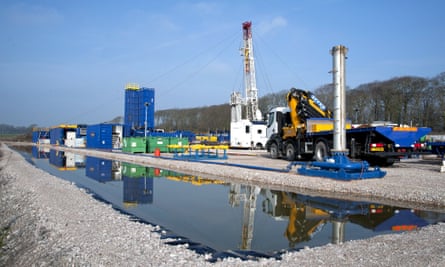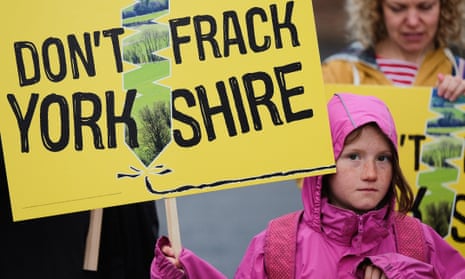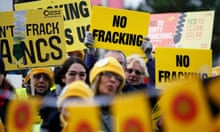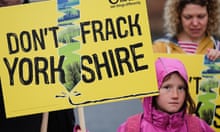This week in the UK, the Labour party announced plans to ban fracking in the UK if elected. Although heavily criticised by one of its biggest union donors, it marks a further shift in attitudes against shale gas in Europe.
When the EU’s trade commissioner met Exxon representatives behind closed doors in 2013, his message to the oil men was unambiguous: the US shale revolution is a paradigm shift.
Fracking was seen as a “game changer” for Europe, raising hopes of energy independence through a relatively cheap fossil fuel, with a reduced climate impact.
In 2011, Poland’s then-president Donald Tusk had already pledged to begin commercial fracking in 2014, after geological surveys estimated the country could possess up to 768bn cubic metres of shale reserves.
Hillary Clinton’s US state department was highly supportive. Senior officials described Poland as “a laboratory for testing whether US success in developing shale gas can be repeated in a different country, with different shales and a different regulatory environment.”
Tensions were rising in Ukraine. Energy security and competitiveness were eclipsing the climate as policy-making priorities and no EU energy event in Brussels was complete without a business lobbyist to make the case for shale gas. Private lobby pitches were equally high-powered.
In 2013, an unnamed BP executive warned the EU’s energy commissioner Günther Oettinger that low post-shale US gas prices had damaged the continent’s competitiveness. “Europe needs to exploit indigenous exploration and production resources ... including Mediterranean exploration and shale,” the official said in a letter seen by the Guardian.
Fracking talk was so ubiquitous that EU civil servants made an ill-advised April fools TV news bulletin about shale gas being discovered beneath the commission’s Brussels HQ.

From hype to silence
Three years later, with even the International Gas Union ruling out a shale revolution in Europe, the discourse of that time has a tipsy feel to it.
France, Germany and Scotland have all banned fracking. The troupe of oil giants that marched to Poland – Exxon, Chevron and Marathon among them – have all marched back empty handed. In Denmark too.
In Romania, Hillary Clinton’s attempts to kickstart a shale gas market for US companies ended in mass protests and Chevron’s departure. In Bulgaria, the US trade mission ended in a fracking ban.
Even the shale gas lobby, which benefited from generous hype as the decade began, has been reduced to gently reminding policy-makers that “shale gas has not gone away”.
On the continent the pro-shale gas case is on the back foot, but environmentalists and industry draw different conclusions from its decline.
Alessandro Torello, a spokesman for the International Association of Oil & Gas Producers, said: “Europe will not experience a US-style revolution, but the potential remains significant and worth looking at. While it is true that at the moment it is difficult to make an economic case for shale in Europe, this is a long-term industry.”
For Friends of the Earth Europe, Antoine Simon countered: “The failure, so far, of shale gas development in Europe is mostly due to a failure by the fossil fuels industry to understand the differing context here. We have a higher population density, a population not used to living in close proximity of gas production fields and higher environmental standards.”
With the possible exception of Spain, the UK is now the last repository of hope for those keen to establish a shale gas industry on this side of the Atlantic.
The UK’s most high-profile shale gas developer Cuadrilla, for example, has found a ready audience in Whitehall for its position that shale gas can be a bridging fuel to a low-carbon future - with benefits for local communities, rather than a fossil fuel lock-in, carrying high risks to human health and the environment.
Fracking could lead to higher emissions
In 2012, the Economist fanned the shale debate with a widely cited ‘fracking great’ report about an International Energy Agency study. The article omitted to mention the study’s warning that a shale boom would raise global temperatures by an “unacceptable” 3.5C.
When burnt, shale gas produces slightly less CO2 than natural gas, which itself emits half as much as coal. But the picture is less clear when it includes methane emissions, which are 56 times more potent than CO2 over a 20-year period, and could trigger feedback loops of global warming.
Professor Bob Howarth of Cornell University, a fracking critic, said that a spike in methane measurements from 2007 measured by Nasa satellite data corresponds with the beginning of the US shale boom.
Even so, the EU decided to classify shale gas as a low-carbon energy source and to shower it with public subsidies. This was in part due to an influential report - later the subject of a complaint (pdf) - in 2013 by the former chair of the US Environmental Protection Agency’s scientific advisory board, Dr David Allen.
Allen and his researchers were given access to 190 shale production sites, owned by major players such as Exxon, Chevron and Shell, and found that methane leaks were much lower than previously thought. The EU later dropped plans for binding regulation on methane emissions from shale gas, instead proposing a risk assessment.While oil and gas prices remain low, the economics of shale gas recovery are unlikely to tempt investors into the European market.
But in the context of the Paris agreement, the risk of buying into a surge in atmospheric methane emissions – or a portfolio of stranded assets – is likely to weigh heavily on the industry’s prospects, outside the UK at least, for some time to come.










Comments (…)
Sign in or create your Guardian account to join the discussion